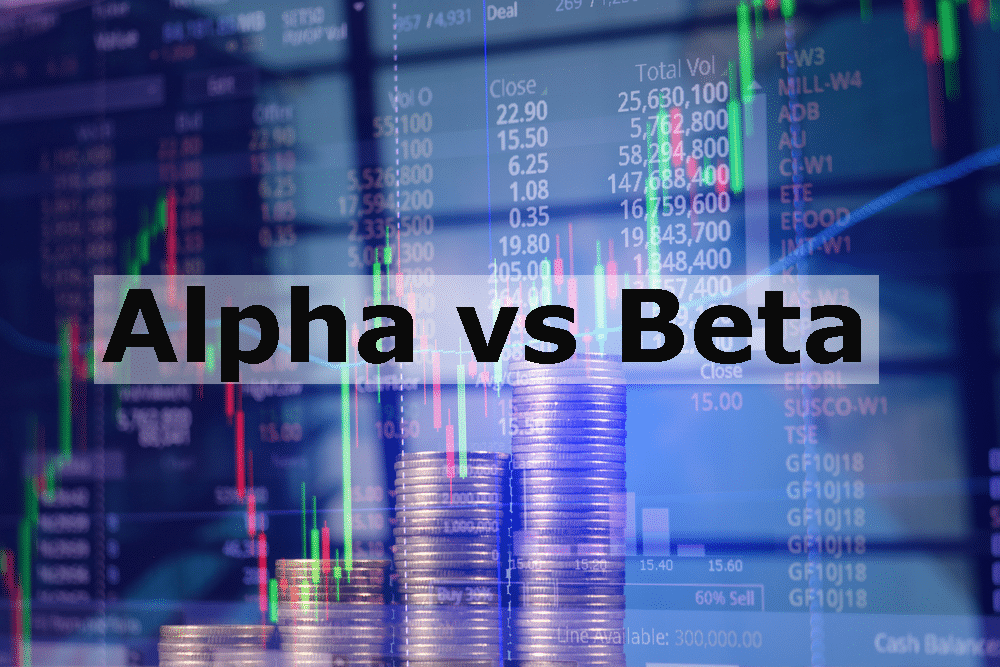
Alpha
Alpha refers to the performance of a security asset versus its ideal performance, measured against the risk taken.
Based on this description, alpha can be viewed as an assessment of a portfolio manager’s ability to generate returns in comparison to a market index. Alternatively, you can view alpha as the extent of the difference between your earnings accrued from a particular stock portfolio and the potential returns you could have earned from an index fund.
Alpha rating helps investors make informed decision making. For instance, assuming that a mutual fund gains 5% while the S&P 500 index to which it is tethered rises by 3%, the fund will be said to have performed better than the index.
In simple terms, you will have gained 2% more from the portfolio than you would have gained if you invested in an index fund. Note, however, that alpha is derived from the past, as opposed to the future performance of a stock. This means that it only gives you an idea of a portfolio’s typical performance and not its future performance.
Interpretation of alpha
An alpha rating of zero denotes that the portfolio’s performance was the same as that of the underlying index. A negative alpha rating means that a portfolio’s performance was below that of a market index. This means you would have earned more by investing in an index fund.
A positive alpha infers that a stock portfolio’s performance was better than the market index. Consequently, investing in it may earn you more profit than in the market index. Following this logic, investments with positive and neutral alpha are generally seen as risk-worthy.
Beta
Beta refers to the receptiveness of stock to the gains or losses of an index. Beta scores start from zero.
Other measures are interpreted as outlined below:
If a stock’s beta is 1.0, then it means that its level of volatility is directly proportional to that of the benchmark index. If a stock’s beta is 2.0, then it has volatility double the index’s volatility to which it is tethered.
For instance, if the benchmark index rises by an average of 5, then the stock will rise by 10. A beta with 0.0 beta is insensitive to the price movements of the underlying index, meaning that when the market index changes by, say, 5, the stock does not move. Cash-based assets tend to depict this characteristic.
If a stock has a negative beta, then it means that for every gain made by the stock, the index loses and vice versa. For instance, if the index loses 5, then the stock rises by 5.
This phenomenon is also known as a negative correlation. It is, however, important to note that the negative connotation of beta does not tell us the direction of price movement for a stock. Instead, it tells us the direction of movement relative to the index.
It follows that beta does not tell us if a stock performed better than an index.
Relevance to investment
It is advisable to weigh both alpha and beta in your investment decision-making. The two factors are useful because they can inform you whether the risk you are about to take is worth the potential returns from the portfolio.
Importantly, you should take note that neither alpha nor beta can tell you how a portfolio will perform.
In addition, investors must consider the inherent volatility in investment and assess whether or not to go ahead with it.
For example, if a stock has an alpha of 1.8, then a rise of 5% by the benchmark index should translate to a 9% gain by the stock. However, as an investor, you may want to evaluate whether a difference of 4% in potential gains is worth the high risk you are about to take by putting your money in a volatile market.
If such a marginal difference is not worth the risk, then you should consider investing in a more stable option like bonds.
In the case of beta consideration for the same stock, the investor will need to decide on whether or not they are willing to take up an investment that is inversely correlated with the benchmark.
In some instances, an investor’s assessment of the economy may give them a reason to believe that certain segments may not perform well in the coming days. It becomes more sensible to invest in a stock with a negative beta value in such a case.
In case your assessment was right, and the index market performs poorly, your portfolio is likely to be cushioned against the losses. The portfolio will therefore be considered a safer bet under such circumstances.
Nonetheless, you should look at the consistency of the stock’s performance relative to its historical performance. If the portfolio has consistently performed below the index, such a portfolio may not be a good choice.
Bottom line
Alpha and beta are invariably essential factors to consider when making an investment decision on stocks. It is vital to know what they mean for your investment and incorporate them into your investment plan.





